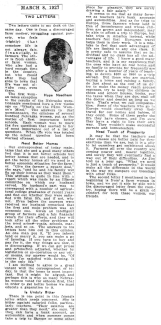Two letters came to my desk on the same day. One is from a discouraged farm mother, struggling against poverty, who feels (rightly) that somehow life is not always fair, financially, to farmers. The other is from another farm woman, who also had a hard enough time in the country, but who found after they had gone to town that life was not always rosy, even there.
The first woman takes exceptions to the results of the Nebraska questionnaire mentioned here a few weeks ago on "What's on the Farm Woman's Mind." The answers to that questionnaire, the opinions of several hundred Nebraska women, put as the matter of first importance better schools. Each woman was to mark the five questions that seemed to her of most importance out of a list of questions. When the vote was totaled up the school question had been marked oftenest.
Need Better Homes
Our correspondent of today maintains that she and a good many others feel that it is not better schools but better homes that are needed, and to get the better homes all we need is a better economic situation for the farmer. "Give the farmer a square deal," she says, "and he and his family fix up their homes as they want them." This attitude is quite in line with a report which was made by an Illinois committee on which my husband served. My husband's part was to correspond with a number of agricultural college graduates of recent years and find out whether they were satisfied with farm life, and if not, why not. Even before the answers were received my husband remarked that the first and main problem was an economic one. Given an intelligent group of farmers and a fair financial return for their efforts, and they will look after all the other problems as the need arises - roads, schools, markets, and so on. The answers to his letters bore him out in this opinion. As one many put it, "If you inherit land or marry it, you can make a go of farming. If you have to buy and pay for it, the way things are now, it is discouraging. If we can get prices and production adjusted, whether by legislation or co-operation or any other means, my answer would be, 'Of course I'm satisfied with farming. It is the only life.'"
I am inclined to agree to a great extent with the correspondent of today, in that the home is the most important. But it might be argued, and perhaps this is why so many Nebraska women voted for schools first, that in order to get better homes we must educate a generation to it.
Is Unduly Bitter
There is one point in this friend's letter which needs comment. She is bitter against salaried folks, particularly teachers. "Their salaries are greater than they need," she says. "If they can have a bank account, an automobile and when summer comes take a trip to Europe or some other place for pleasure, they are surely drawing a fair salary."
It seems to me that as many farmers as teachers have bank accounts and automobiles. And as for trips to Europe, those farmers whose land is free of encumbrance and whose children are grown and independent may be able to afford a trip to Europe, but take trips in America instead, while teachers feel that European travel helps them in their work. It is a mistake to feel that such advantages of life are limited to any one class. It is pretty safe to assume that no individual and no class has all the advantages of life. I know a good many teachers, and it is my experience that the ones who have no real home and no family to provide for frequently are able, after a number of years of teaching, to devote $500 or $600 to a trip abroad. But those who are married, buying a home and raising a family, do just about as the rest of us do; try to make the money reach around expenses, try to keep the children in shoes and school houses, books, pay the taxes when they are due, stall off the doctor and dentists as long as we dare. That's what we call compensation. Some of the teachers who go to Europe would cheerfully swap their travel for our homes and babies, if they could. Some of them prefer the life they have chosen, and I"m sure they have a right to live their own way. They wouldn't make successful parents and homesteaders.
Need Touch of Prosperity
It may be that the teachers and other classes are better paid for their exertions than we are, but it is a pity to let ourselves get embittered about it. Farmers all over the country are coming nearer and nearer together, and surely they will eventually find a way out of their difficulties. As Jim told us a year ago, "What we need is just a touch of prosperity." It would make all the difference in the world in the way we compare our blessings with other folks.
The second letter I mentioned in the beginning is from a farm woman in town, and we put it side by side with the discouraged letter from the country, hoping there will be a grain of comfort for both these women, our friends.

